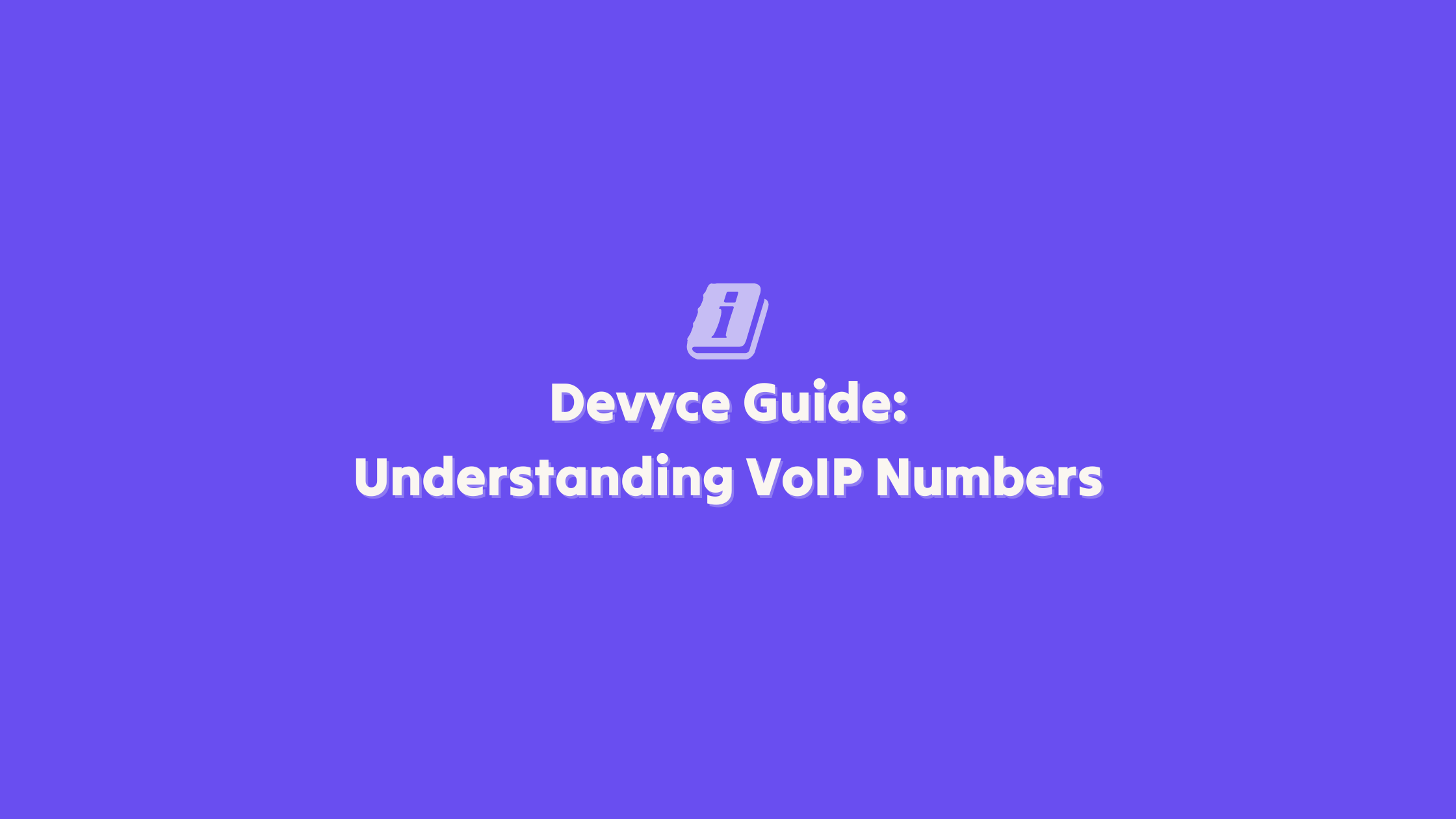
Key Takeaways
- VoIP numbers offer numerous benefits for businesses, including cost-effectiveness, scalability, mobility, and access to advanced calling features.
- VoIP numbers are highly flexible and portable, as they are not tied to physical locations or hardware.
- The process of obtaining a VoIP number is straightforward. The setup can be done in just a few minutes, allowing businesses and individuals to quickly enhance their communication capabilities.
What Is a VoIP Number?
VoIP stands for Voice over Internet Protocol. A VoIP number is a virtual phone number that allows users to make and receive phone calls over an internet connection (WiFi or data). Phone numbers from mobile network operators are associated with a physical telephone line or a SIM card. On the other hand, VoIP numbers are not tied to anything, making them highly portable and flexible.
VoIP numbers often offer a range of features, such as call routing, voicemail, call recording, and more, making them a popular choice for cost-effective and versatile business communication solutions.
Benefits of Using VoIP Numbers
There are many benefits to using VoIP numbers. Especially for businesses needing a company phone number. Here are the top benefits of using a VoIP number for business:
- Cost-effectiveness: Subscribing to a VoIP phone service is significantly cheaper than with traditional carriers. VoIP services often offer lower calling rates, especially for international calls. This leads to significant cost savings for businesses, especially those with high call volumes.
- Scalability: Tech scalability is important for growing businesses. VoIP systems are highly scalable as businesses can easily add or remove lines as needed. This is difficult to do with traditional solutions such as landline desk phones, where lots of hardware is needed. The flexibility that VoIP provides is particularly beneficial for growing businesses or those with fluctuating call volumes.
- Mobility and flexibility: VoIP numbers are not tied to physical locations. Instead, they’re stored in a cloud network. Enabling employees to make and receive calls from anywhere as long as they have a stable internet connection. This mobility allows for remote work and the ability to stay connected while on the go.
- Advanced features: VoIP systems offer a wide range of advanced features that can enhance business communications. These include call forwarding, auto-attendant, call recording, and software integrations e.g. CRM systems. Taking advantage of advanced calling features helps businesses to create a better communications experience for both customers and employees.
- Analytics and reporting: Some VoIP providers may offer detailed call analytics and reporting. This provides businesses with valuable insights into call volumes, call durations, and other metrics. Having access to this data is key as it allows you to determine your strong and weak points, empowering a data-driven approach to business growth.
- International presence: It is easier to obtain international numbers with a VoIP service than through traditional routes. International numbers allow businesses to establish a local presence in global markets without needing a physical office. This is advantageous for expanding into new markets and customer service.
- Integration capabilities: VoIP phone systems can integrate with other business applications and tools such as customer relationship management (CRM) systems. This creates streamlined workflows which increase efficiency and productivity. It’s particularly helpful for customer service teams or sales-based teams.
- Better Security: Traditional phone lines can be disrupted by environmental changes. VoIP numbers, on the other hand, are not tied to physical infrastructure and can be quickly rerouted to alternative locations or devices, ensuring uninterrupted communication during emergencies. This is important for keeping company data secure and ensuring company information doesn’t get lost.
How to Obtain a VoIP Number
The process to get a VoIP number is more straightforward than you may think! Follow these easy steps to get a VoIP number:
- Do the research: It’s important to research the options available before you sign up. You’ll need to take into account your needs, budget & pricing, features available, and the type of number you need e.g. mobile, landline, or international. This allows you to choose a provider that best provides all that you’ll need, saving you time and money later down the road.
- Get in touch with your chosen provider: Once you’ve chosen a provider, you may wish to get in touch with them if you have any questions or additional requirements for your VoIP number e.g. specific features. It can be helpful to speak with a member of the team to help determine if they’re the right fit for your specific needs.
- Sign up for an account: Be sure to get a grasp of the types of pricing plans offered. Many VoIP providers offer contracts for a minimum of 1 year. It’s important to factor this in with your available budget. Alternatively, you may wish to find a provider with a subscription model of pricing whereby you pay monthly and aren’t locked into a contract.
- Choose your number: Some providers may give you the option to choose the VoIP number you’d like to use. However, most providers will assign you a phone number. If you’d like to keep an existing phone number, you could also port your phone number over to the provider. You’ll need to get in touch with the provider to do this.
- Set up your VoIP Phone: VoIP numbers can be set up with VoIP desk phones or your mobile phone. If you opted for a VoIP desk phone, you’ll need to get these delivered and your provider should provide instructions on how to set these up as well as any equipment you may need. If you opted to use VoIP on your mobile phone, you’ll be prompted to download the provider’s app following sign-up. You’ll be provided account details which allow you to log in to the VoIP platform. With both VoIP phones and VoIP on mobile, you’ll need to configure your settings such as call forwarding and voicemail and then you should be good to go!
Frequently Asked Questions about VoIP Numbers
Can I keep my existing phone number when switching to a VoIP number?
- Yes! Usually, you can bring your existing number over to a VoIP provider by porting your number. Get in touch with your VoIP provider to let them know you’d like to keep your existing number and they will guide you through the process.
What equipment do I need to use a VoIP number?
- Barely anything if you want to use VoIP on a mobile! VoIP numbers can be accessed through an app that is downloadable on your existing phone. No need for a second handset or clunky desk phones and landlines! However, if you wish to use a VoIP desk phone, you’ll need to speak with your VoIP provider to get the VoIP phones delivered and
Can I use a VoIP number on my mobile phone?
- Yes, if the VoIP provider’s services are accessed through their app, you’ll be able to use VoIP on your mobile phone.
Can I make emergency calls (999) with a VoIP number?
- It’s not recommended that you make calls to emergency services using a VoIP number. You may not be able to get through to emergency services if their lines don’t recognise VoIP numbers. Furthermore, as VoIP numbers aren’t tied to a specific location, emergency services cannot use geolocation to find a caller in the event they are unable to speak (silent call).
Is call quality with VoIP numbers as good as traditional phone lines?
- Call quality with VoIP numbers is even better than that of traditional phone lines. This is because internet speed advancements result in much clearer call quality.
Can I make international calls with a VoIP number?
- You should be able to make international calls with a VoIP number however be sure to check with your VoIP provider as there may be international calling fees.
Are there any limitations or restrictions when using a VoIP number?
- There are general limitations to using VoIP eg. not able to call emergency services. However, your service may have specific restrictions depending on the VoIP provider. It’s best to check with your provider about this.
Can I send and receive text messages (SMS) with a VoIP number?
- Yes, you should be able to send and receive text messages with a VoIP number if you use VoIP on your mobile phone.
What happens if my internet connection goes down? Will I still receive calls?
- If your WiFi goes down then you could still access your VoIP number with a data connection. However, if both are unavailable then you won’t receive calls or texts until an internet connection is re-established.
Are VoIP numbers secure and private?
- When configured correctly, VoIP numbers are generally more secure than traditional phone numbers. However, you’ll need to consider cybersecurity measures to implement to protect your company data when using VoIP as your business communications solution.
Can I have multiple VoIP numbers for different purposes or locations?
- Yes, you can have and use multiple VoIP numbers for different purposes. You’ll usually need to purchase a separate plan for each phone number. You can also get numbers from different locations if your VoIP provider offers this.
Conclusion
VoIP numbers are a convenient way to obtain a second phone number eg. for business. VoIP operates on an internet connection as opposed to traditional telephone lines giving it various benefits. It’s cheaper to obtain and maintain as well as giving users clear call quality and access to advanced calling features like call forwarding. Getting a VoIP number is an easy process and you can get set up in just a few minutes. Embracing the simplicity and flexibility of VoIP numbers can greatly enhance communication capabilities, making it an attractive choice for businesses and individuals alike.
